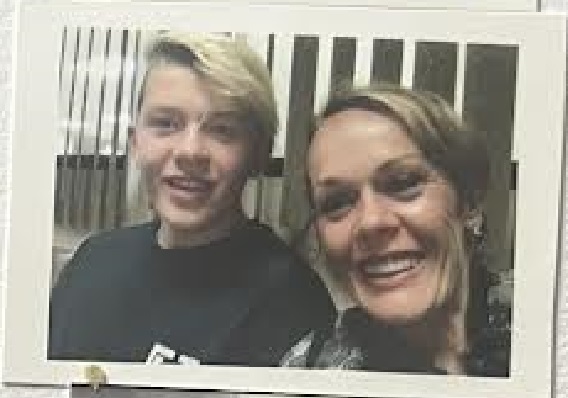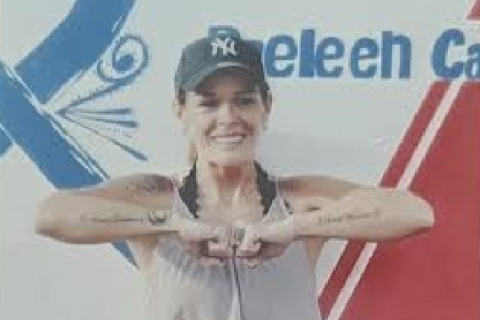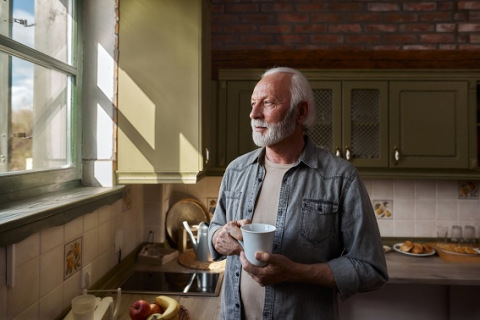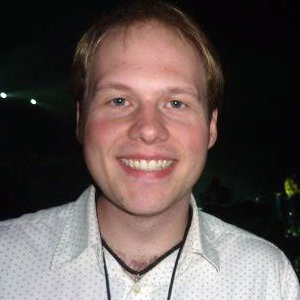Advice, Challenges and Support: Nearing 10-Years of Survival

Raeleen Minchuk Prokopetz has spent the last decade on a mesothelioma journey that began with a diagnosis at the age of 36. She was told to get her affairs in order when she was told she had mesothelioma in October 2014.
As the mother of young sons, Raeleen was committed to fighting. She underwent aggressive treatment and hasn’t had a recurrence of mesothelioma since.
Raeleen shared a story with us at The Mesothelioma Center at Asbestos.com that’s a clear example of her fighting spirit. During surgery for peritoneal mesothelioma cancer, her colon was severed and she lost the use of her left leg. Doctors told her it would take a year to return to normal. She requested a leg brace and a cane and refused physiotherapy. With her knowledge as a former athletic trainer, she regained the use of her leg in just 2.5 months.
She underwent a peritonectomy and later hyperthermic intraperitoneal chemotherapy. Her peritonectomy involved a 10-hour procedure during which multiple organs, portions of organs and as much of the cancer as possible were removed. Raeleen’s HIPEC procedure removed any remaining cancer cells and bathed her abdominal cavity with heated chemotherapy drugs.
“The day that I was told I was going to die I was 36 years old and a mother,” Raeleen told us. “I went into automatic fight mode and I never shut that off.”
My Support System Is Vital
Raeleen says having a support system is a must for all mesothelioma survivors. She says that support was critical.
She shares that her support system – her sons, her granddaughter and her sister – made a huge difference for her. From the very beginning Raeleen says her family has always been there for her.
“I have a great support system,” Raeleen said. “My sons love me. My granddaughter loves me.”
Being part of a support group with others on similar journeys is key to staying strong mentally and emotionally, according to Raeleen. She adds that even if people aren’t diagnosed with cancer, but are managing other asbestos-related diseases, support groups can help.
“You really need that support group of cancer patients. I would recommend that to anybody with mesothelioma,” Raeleen told us. “Just having that support group, especially for people with this specific type of cancer, because navigating it is so different than any other type of cancer.”
Celebrations and Challenges as 10-Year Anniversary Nears
Today at 45 years old and nearing the 10-year anniversary of her mesothelioma diagnosis, Raeleen says she’s still a fighter and has a lot of reasons to persevere through her challenges.
“I’m opening a golf simulation sports lounge soon,” she shares. “I have a house in the Dominican Republic. I have my granddaughter. I use this as my uplifting fight.”
Raeleen’s love of family, her professional drive and her strength have helped her throughout her mesothelioma journey. She’s grateful to be recurrence free almost 10 years later and excited for all she has to look forward to, but there are some times now when coping with a mesothelioma diagnosis can be challenging.
She shares that as hard as her mesothelioma diagnosis was at 36, her children were younger, lived at home and needed her. Being healthy for them was significant motivation. Now that her children are grown and out of the house, being an empty nester has presented new challenges.
“I have people around me, don’t get me wrong,” Raeleen explains. “But I don’t have that person beside me every day being positive. I’m trying to navigate a new life of living by myself in the countryside and the motivation is just not there quite the same way it was.”
She adds, “I fought in the past because I was a mom and I had to fight. It didn’t matter what I had to put my body through.”
Being busy being a mother and in the thick of surviving mesothelioma, Raeleen says she didn’t have the space to process the trauma of her diagnosis before. While she’s celebrating her upcoming 10-year milestone, she’s also processing her journey and finding new ways to motivate herself to stay healthy.
“Now that my children are grown and they’ve moved on, I’m realizing mesothelioma affected every choice and everything that I did,” Raeleen told us. But with a new business venture, family and friends, she says “I just keep trying to push through.”

Mesothelioma’s Impact on Mental Health
Licensed mental health counselor Dana Nolan works with mesothelioma patients and moderates an online support group with The Mesothelioma Center. She says mesothelioma survivors can experience a number of mental health challenges after being free from cancer.
“It’s very much a mixed experience, it’s wonderful to be alive but if the effects of surgeries and treatments still affect them, that’s still a challenge,” Nolan explained. “I think that needs to be recognized and treated if at all possible and definitely validated.”
Nolan explained people can experience survivor’s guilt after living through a mesothelioma diagnosis and treatment. The psychological phenomenon can be linked with PTSD, anxiety disorders and complicated grief.
“I think sometimes cancer survivors might feel like they’re complaining about their long-term effects,” Nolan said. “Clearly as a long-term survivor, you’re in the category everybody wants to be in when you’re diagnosed. A lot of times survivors feel like they don’t have permission to say some days it’s really hard.”
Nolan says it can be hard to find the balance of wanting to be grateful, but also hold space for the challenges they face. This struggle can cause added stress.
“It’s very possible to be absolutely grateful that you’re alive, but also recognize it doesn’t take away the fact that they have pain,” Nolan adds. “Their body may not work the same way as it did before.”
Nolan agrees with Raeleen that a support system is critical and support groups are a great way to build community. It can especially be beneficial for survivors without loved ones to lean on.
“Support groups can help survivors create their own family. Sometimes you have to make your own family,” Nolan said. “Create your own circle of people. But to do that it means you need to put yourself out there and reach out.”
Raeleen’s Advice For Fellow Mesothelioma Survivors
Raeleen says she wants other mesothelioma survivors to remember her powerful message of hope: “Hold on. Hang in there. Use the love and the positivity you have around you. Find those things that trigger your heart. You’ll be surprised what you are capable of when it’s demanded of you.”
Knowing the challenges mesothelioma survivors face first-hand, she offers a listening ear to anyone who needs one. Raeleen says she often speaks to others at different points in their mesothelioma journey.
“I’m there 24/7. You can call me at 3 o’clock in the morning. I’ve talked to people from Europe and all over the United States, Brazil, Portugal,” she notes. “You have your family support system, but you also need a support system of people like me – people who’ve been through it. We’ll help you find those connections you need.”






